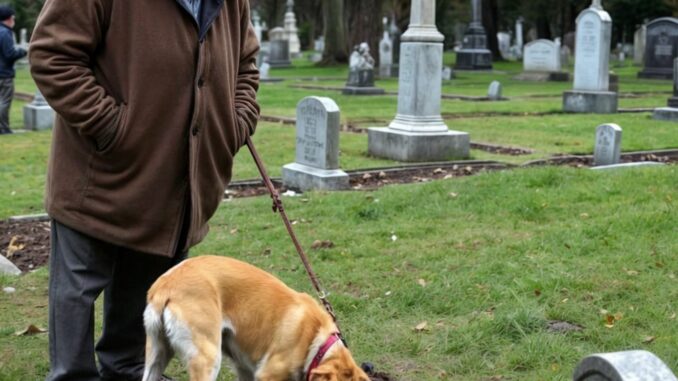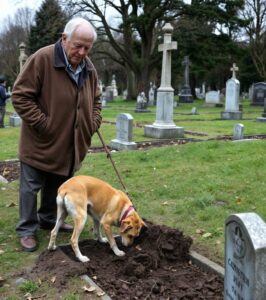
Fyodor Petrovich had long wished to visit the cemetery where his son was buried. However, his declining health had made it difficult for him to fulfill this desire. He had prepared paint and tools in advance, and today, upon waking up feeling better than usual, he decided it was time. Over breakfast, he thought about how two months ago he had noticed the fence around his son’s grave leaning, the gate hanging at an odd angle. It was hardly surprising—ten years had passed since he had laid his boy to rest.
Sasha had not been his biological son. Fyodor Petrovich and his wife had spent twenty years together but had never been able to have children of their own. After much thought, they decided to adopt. At the orphanage, their attention was immediately drawn to a frail five-year-old boy sitting alone, his sad eyes filled with silent pain.
“Why is he by himself?” Fyodor Petrovich asked.
“Sasha is different,” the caretaker replied. “His mother left him here six months ago. It was heartbreaking—he clung to her, sobbing, refusing to let go. Since then, he has kept his distance from everyone, unable to forgive or understand why she abandoned him. No matter how much we try, he doesn’t open up to anyone.”
In that moment, Fyodor Petrovich and his wife knew they had found their son. They were determined to show him that life was not just a series of betrayals. While the adoption process was underway, they took him on outings. He obediently did everything they suggested—ate ice cream, rode the carousel—but his eyes remained hollow.
It took a full year before Sasha finally began to trust them. One evening, he cautiously approached Fyodor Petrovich and asked, “You won’t leave me, will you?”
“Never,” he promised.
Sasha pressed himself against him and cried. From that moment on, they no longer thought of him as adopted—he was simply their son. He brought them joy in everything he did. He excelled in school and later enrolled in a military academy, a rare path for boys from their small village, making his parents incredibly proud. During holidays, instead of coming home to rest, he would help them with chores. The villagers often remarked on how fortunate Fyodor Petrovich and his wife were to have such a devoted son.
Sasha remained in military service for several years, though his parents worried whenever they lost contact with him. They knew he was often sent to dangerous places. Eventually, he was discharged for health reasons. His once-bright spirit dimmed, and two years later, he fell gravely ill. The doctors shook their heads; the illness had been discovered too late.
After Sasha’s death, his mother did not live long. Fyodor Petrovich was left alone.
One morning, he stepped outside, and his old dog, Buyan, came to his feet. The dog had aged considerably, its muzzle now gray. If translated to human years, he and Fyodor Petrovich were nearly the same age.
“Well, Buyan, shall we go visit Sashenka?” he said. “Let’s go.”
As if understanding, the dog wagged its tail eagerly.
They locked the gate behind them and started down the dirt road. The cemetery was on the far side of the village, requiring them to walk through town and then another kilometer beyond.
“Good day, Fyodor Petrovich! Where are you and Buyan off to?” called out Maria Stepanovna, a neighbor.
“Hello, Maria Stepanovna. I’m going to visit my son and my wife. The fence needs fixing, and I plan to give it a fresh coat of paint.”
“But how are you holding up? You’ve been unwell. Why not ask someone for help?”
“I have no grandchildren to turn to, and hiring a stranger… well, you know how it is. They’d take my money, and I’d just have to redo it myself. It’s better this way.”
They continued on their way. At the cemetery entrance, they passed a man who was clearly not from their village. He didn’t offer a greeting, which was unusual—everyone here, even strangers, exchanged pleasantries.
The cemetery itself was in disarray. A storm had recently passed through, scattering broken branches everywhere.
“We have our work cut out for us, Buyasha,” he sighed.
The dog growled low in its throat.
“What’s gotten into you? That stranger bothering you? I didn’t like him much either, but it’s none of our concern.”
As Fyodor Petrovich gathered branches, Buyan suddenly began to dig furiously at the base of the fence. Dirt flew in every direction, and the dog barked frantically.
“Calm down, boy,” he said, approaching.
Buyan continued until a cardboard box became visible beneath the soil. It had been buried recently—the damp earth had not yet soaked through it.
With effort, Fyodor Petrovich pulled the box free. Then something inside moved. His hands trembled as he tore at the cardboard. Buyan circled around him, barking wildly.
Inside, wrapped in rags, lay a tiny newborn baby girl. She squirmed weakly, mouth opening soundlessly, too exhausted to cry.
“Oh, dear Lord!”
Without hesitation, he gathered the baby in his arms and rushed toward the cemetery exit. Buyan bolted ahead, barking as if summoning help.
He ran straight to Olga Sergeyevna’s house—the retired village paramedic. She was in her garden when she saw him coming, panting and clutching the tiny child.
“Fyodor Petrovich, what’s wrong?”
“Found… buried… in a box…” he managed to gasp.
The baby whimpered softly. Olga snapped into action, taking her inside, wrapping her in warm towels. Her husband called emergency services and the police while the entire village gathered, murmuring in shock. Someone gave Fyodor Petrovich heart drops.
The next morning, an unfamiliar car pulled up to his house. A tall, sturdy man stepped out, carrying a box.
“Are you Fyodor Petrovich?” he asked.
“That’s me,” he said, standing with difficulty.
“My name is German. I’m the baby’s grandfather. You saved my granddaughter’s life.”
He placed the box on the table alongside a thick envelope.
“This is for you—some treats, and money for anything you need. I know gratitude can’t be measured in money, but I don’t know how else to thank you. Please accept it.”
Fyodor Petrovich sat heavily in his chair.
“My daughter married a man I never trusted,” German explained. “He only wanted her for money, but she wouldn’t listen. When she became pregnant, I thought maybe I was wrong. But she died in childbirth. I didn’t even know. The baby survived, but my son-in-law wanted to claim her inheritance, so he tried to get rid of her. I never imagined such cruelty. He’s been arrested, and my granddaughter… she’s all I have left of my daughter.”
“I understand,” Fyodor Petrovich said quietly. “Is the baby alright?”
“Thanks to you, yes. She’ll be okay.”
Later, as he recounted the events, he mentioned that he had originally come to fix the cemetery fence.
Days passed before he could move normally again. When he finally did, he took a measuring tape and set off to order a new fence. Buyan trotted beside him.
“Coming with me, old friend?” he asked.
The dog wagged his tail.
At the cemetery, he was stunned to find a newly built memorial. The graves of his son and wife were now surrounded by a pristine black metal fence, the ground covered in white gravel. Their names were etched into elegant stone markers.
“German,” he murmured, understanding at once. “Thank you, kind man.”
He sat on the bench, speaking softly to his son and wife.
“Now you can rest easy. Everything is as it should be.”
That evening, Maria Stepanovna noticed Buyan return home alone. The dog whined, restless. Sensing something was wrong, she gathered the neighbors, and they hurried to the cemetery.
They found Fyodor Petrovich sitting on the bench, a peaceful smile on his face. He had passed away.
German arranged the funeral. Buyan refused to leave his master’s side. Two years later, the old dog died near the same fence and was buried beside him, remaining loyal to the very end.
